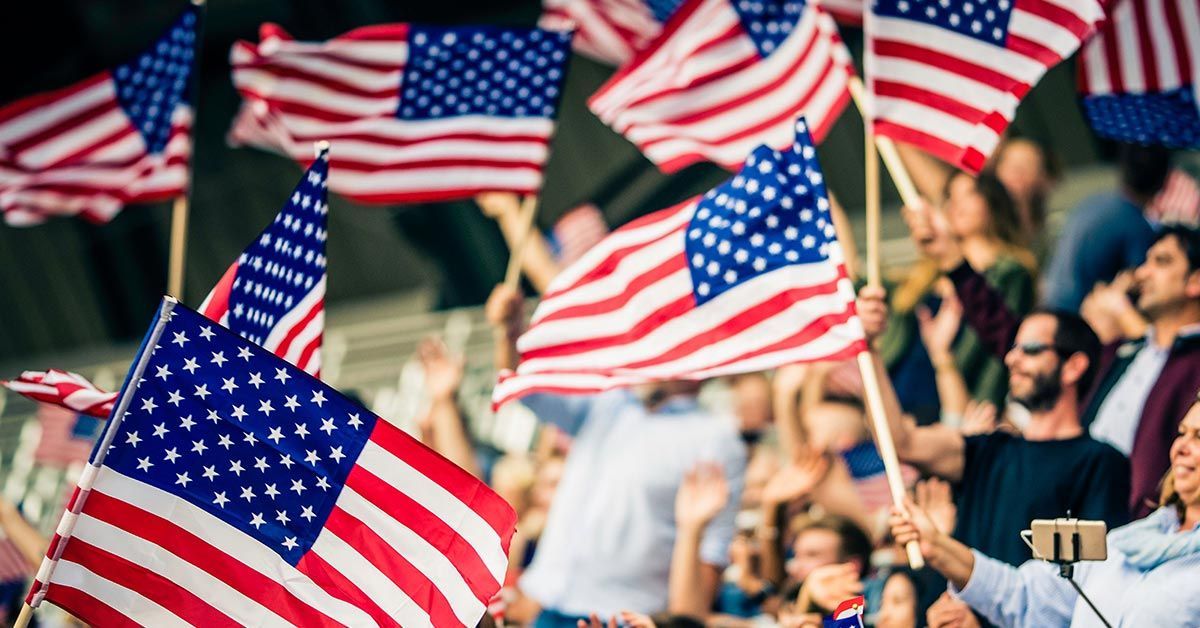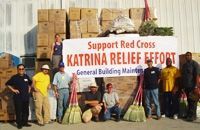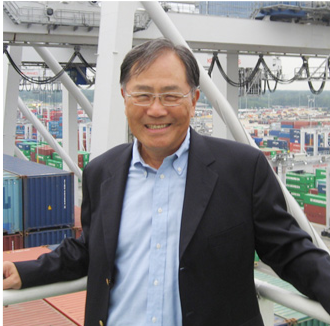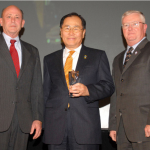For Public Audiences
For Public Audiences
Contents will be added here

By Sunny K Park
•
August 7, 2024
Take Care of Your New Country Sunny K. Park, Founder, Good Neighboring Foundation, Inc. Speech to new US citizen candidates, US District Court, Pensacola, FL July 19, 2024 Good morning! It is a memorable day in the City of Five Flags. I am so honored and excited to address all of you as our newest esteemed Americans at this historical Courthouse, presided over by one of the most patriotic Americans I know, Judge Davis. Many of you know Judge Davis’s father Raymond Davis was a 4-star USMC General, he was recipient of the Congressional Medal of Honor. General Davis and his comrades fought in Korean War and saved 50+ million South Koreans. South Koreans are so thankful to all of them. Thank you, Judge Davis, for this invitation and your kind introduction. I liked that you used the exaggerated version of my resume. I also want to express my gratitude to everyone serving in today’s auspicious program, as well as all the volunteers and scout members. It is truly an honor to join all of you! I currently live in Atlanta, Georgia. I am here today with three good friends who are travelling with me to join this celebration: Mr. Sean Park, Mr. Ki Hwan Kim, Mr. Seung Kwon Suh. Thank you to them for accompanying me today. New Americans! Your American Dream starts today! Welcome to America! You all look fabulous and happy! I am Sunny Park. An American by choice. I still remember the morning when I became a U.S. citizen 4 decades ago. As I left the citizenship ceremony, I kissed the ground, and looked up to the sky while waving American flag and promised my new country ONE thing: “America, I don’t want you to lose money on me. I will try to be one of the best citizens in American history, so help me God!” I have yet to achieve this goal, but I am still working hard to serve my neighborhoods, communities, and country. When I first arrived the US as a Korean immigrant, I had no English ability, no money, well, I had $200, and no relatives in this country. Despite these obstacles, I stand in front of you this morning to share that the opportunities are boundless in this great country. I could do it, and certainly, I believe you can do the same or more because you are living in a country where “anything IS possible.” Once I became a US citizen, being a patriotic American was easy for me. However, before I became a citizen, there was one decision that I had to struggle with before committing to becoming 100% loyal American. I believe when a person decides to become a citizen of a country, they must choose one nation to commit their complete loyalty and heart. As we all know, one man cannot have two wives at the same time (without getting into a lot of trouble). I had thought perhaps about splitting my commitment to serve both my motherland of South Korea and new adopted country of the United States, but I soon realized that the United States does not deserve my divided loyalties as I read through the Oath of Allegiance. I finally made a bold decision to put my beloved country, Korea, in my heart! As you probably studied, America has a unique history that requires its citizens commitment and dedication. For example, this nation’s earliest settlers, including British immigrants, were called to bear arms and shoot rifles against their own descent, British troops, to defend this land during the Revolutionary War when the US was fighting for its independence. The United States needs your firm and undivided loyalty as much as You need America’s protection and commitment to you! The Oath of Allegiance is a contract between each of you and the U.S., and we should meet these obligations as citizens. Mainly, America wants you to be a patriotic American and a valuable neighbor to others. The bottom line, this country does not want fake Americans. I don’t know about you, but I feel “goosebumps” every time I hear our national anthem and see the waving American flag. As you start your journey as new Americans, I have three items to suggest each of you: Number one: Enjoy your freedom as a proud American. America is the Land of the Free and the Home of the Brave. In this nation, you can do anything you want under the rule of law. Please enjoy your freedom, but also please remember how freedom is being provided. It is not free. There are millions uniformed service men and women, many of them are foreign born Americans like you and I, soldiers and first responders serve to keep our neighborhoods and our country be safe. Number two: Make the most of the Land of Opportunity offers. America is a unique place of opportunities. You can be very successful here if you try and work hard. I worked 12-16 hours per day and 6 days every week for over 45 years. It didn’t hurt me but helped me. I challenge all of you to plan a few outrageously high personal goals for your American dream and enjoy working hard to achieve it. When I first arrived in the U.S., I had set a personal goal to someday pay $1 million income tax annually to my new country. At the time, I was only making $1.80 an hour. To reach this ambitious goal, it took me 23 years. It was not an easy task, but I had great fun striving to achieve it. Did I hear that some of you want to know how I did it? I can share one of my car salesman days’ stories, it will take 3 extra minutes of your time though. One rainy day in Georgia, a family of four, a couple and two young children walked into the car dealer where I was working and looking for a new car to buy. They were looking for a light blue Malibu Classic with 4 doors to buy. Unfortulately, we didn’t have a light blue model in stock. I checked other Chevy dealers in the Atlanta area but there was none in town. The disappointed customer settled to purchase a dark blue car which we had in stock, instead. I finished the paperwork and completed the sale. They are to come back tomorrow to pick up the new car. However, the family was not happy with the decision to buy a car not the color they like, light blue. I didn’t like to sell a car the customer is not happy with. I stopped them and told them not to buy a car they are not happy with. I promised to find a car in light blue for them. They were puzzled but agreed with me and left. I checked stocks at all Chevy dealers in the East Coast and found a light blue car in Knoxville, TN. I was thrilled to find the car and imagined the family’s happy faces. I left Atlanta At 4 AM the next day for Knoxville TN, 4-hour drive one way, swapped the car and drove the light blue car back to Atlanta, and delivered the car they were looking for a long time. As the new car rolled out of the car dealers parking lot, I was happy to see the family was happy! At those days, car salesmen usually make about $100 per car sales as commission. After they left me, I checked my commission for the car sale, and I was disappointed in myself. I only made $20 commission for 2 full days’ work and expenses for 8 hours travel. But there was nothing I could do about it, I tried hard to forget. Fast forward, about a month later, I received a call from the man of the family bought the light blue car. He invited me to his office to discuss the fleet sale of the company. This gentleman was the purchasing manager of Scientific Atlanta, they make big satellite dish antennas, was small company but growing fast, later they were acquired by the tech giant Cisco. He told me that he was impressed with my customer service and wanted to buy the company fleet, vans and trucks, from me. To his Company in the following 2 years, I ended up selling more than 200 vehicles, and made a lot more commission than $100. The reason I shared the story is because I want you to be happy by making others happy. I ask you to practice the Golden Rule, treat others the way you want to be treated. If you forget, it is in the Bible, Matthew 7:12. Number three: Take care of your Country The United State of America is ours! As US citizens, you will be one of owners of the U. S. It is like you just bought a castle as your new home. Question. Who is going to take care of the castle? YOU! Let me explain with an analogy. What do you do when you live in a temporary rental apartment and the roof starts to leak? You will call the management office, and they will come and fix it for you. What do you do when you own your house and your roof leaks? Yes, no matter what time, or how heavy the rain is falling, you will be on the roof top and start making the repair. Everything that is GOOD in this country is yours, and all that is NOT THAT GOOD like the roof leak, is also yours! While you are enjoying American life and US citizenship rights; If you see some garbage litter around on the street in your neighborhood? It is your duty to pick up. You hear some people bad-mouth about the United States? It is your duty to shut them off. We cannot just complain but need to actively contribute to fix problems together with other Americans. America is expecting and deserves your L O Y A L T Y, Commitment and Service! I wish you the best, and pray for God’s blessings for each of you, and our great Nation. With all our active care and service together, the United States will continue to be the best place to live, and strongest nation in the world! This Land Is Your Land! Welcome to America!

By Sunny K Park
•
October 10, 2023
I am not an “Anglo-Protestant” but a patriotic American from South Korea, and I disagree with Joe Rodriguez’s column (“Immigration now cultural issue,” @issue, March 30). I believe immigrants in this country need to stop and think what we cando for the United States, rather than our former countries. America is a land of opportunity — but for those who put America first, not for anyone deteriorating the core value. I urge immigrants to be more patriotic for the United States, as we will be a majority of the nation by 2050. If not, America can no longer be the land of opportunity but become a country like where we came from. SUNNY K. PARK, Atlanta

By Sunny K Park
•
October 10, 2023
Your editorial on the first business day of 2005 is a disappointment (“Chinese new year,” Jan. 3). I am frustrated by the loser’s attitude I see among young, healthy Americans. Attitude is an effective strength China has over us. The Chinese work many more hours than Americans, who play many more hours than the Chinese. Our trade deficit will never be fixed until all Americans start working as many or more hours than the Chinese. I fear we may have to read the same editorial every year. SUNNY K. PARK, Atlanta

By Sunny K Park
•
October 10, 2023
On December 7, 2007, an oil tanker collided with a barge in the Yellow Sea of South Korea, causing oil to spill and contaminating South Korea’s west coast. This accident severely affected the fishermen who make their living there, as well as the area’s ecosystem. The Korean American community was shocked to the news, began raising money to help Korean victims. The Korean Americans in New York raised relief funds and collected $12,450. The Korean Americans in Southern California area made a visit to the damaged area in Korea and worked hands-on to strip oil off the coast and delivered relief funds totaling $20,000. Korean Americans from most of major U. S. cities voluntarily set up temporary fund-raising task forces. Korean Americans felt personally affected by this oil spill in Korea. On April 20, 2010, an oil rig exploded in the Gulf of Mexico; oil has been spilling out continuously ever since—200,000 gallons a day from the bottom of the sea, spreading out and contaminating the Gulf of Mexico. Nearby states declared states of emergency as spilled oil approached the coast of each state. More than 2,000 officials from 16 federal agencies, 5,000 National Guardsmen, airplanes and 300 ships have worked together to try to keep the oil from spreading. The Washington Post reported on May 2 that the shrimp caught in the gulf already smell of diesel. Both Korea and the United States experienced oil spill disasters. The difference is where they happened. This time, the disaster occurred in the United States, where we and our children live—not in Korea, where we used to live. Reportedly, this disaster will disrupt a significant source of fish, and the beaches of the Gulf of Mexico could end up covered in black oil. Reuters reported that the cost of the damage is expected to reach $14 billion. The damages to the fishery and hospitality industries are enormous. News of this oil spill makes me want to ask my fellow Korean Americans—those who intend to make the U.S. their permanent residence—the following question: “Does this oil spill in the Gulf of Mexico trouble you as much as the one did in Korea a few years ago?” If your honest answer is, “No, it doesn’t,” I’d like to ask, “Why not?” The answer is probably that you see the Gulf of Mexico oil spill as someone else’s issue, but the oil spill off South Korea is your issue. Generally speaking, for Korean Americans, news from Korea hits them in their hearts, but U.S. news only hits them in their eyes and ears. As long as Korean Americans continue to feel that the problems of the U.S. are someone else’s problems, we should expect the same treatment if tragedy befalls us. If a disaster happens in a Korean American community, why should we expect mainstream American to care if we don’t exhibit the same care about what happens in mainstream America? This is a potential disaster for Korean Americans. We are planting our roots and the roots for our children in this country. We need to act and react accordingly. When we begin to feel America’s pain along with other Americans, then we’re laying the foundation for proper relations within U.S. society. Without a foundation, we can’t expect to build walls and a roof either. Am I naïve to expect that Korean Americans should have at least the same feelings and react with at least the same desire to help those around the Gulf of Mexico as they did when the oil spill happened in Korea? On December 7, 2007, an oil tanker collided with a barge in the Yellow Sea of South Korea, causing oil to spill and contaminating South Korea’s west coast. This accident severely affected the fishermen who make their living there, as well as the area’s ecosystem. Sunny Park, Director General, Good Neighboring Foundation

By Sunny K Park
•
October 10, 2023
“My goal is to be an American giver. Not a taker, a giver. That’s what I see as the true American ideal. The Community Foundation helps me effectively participate in that.” Sunny Park epitomizes the American Dream, living out the great American immigrant story of vision, determination, opportunity and hard work. Significantly, his first experience of philanthropy played a role in launching the life he has created for himself. “I was a child in Korea during the Korean War. We had nothing, but we still went to school. The only pencil I had was so short that I couldn’t hold it; I had to tie it to a stick to be able to use it. We had no paper, so we would write between the printed columns on old newspapers. That is how we studied. Then, all of a sudden, one day I got a dozen new pencils. Not just one—a dozen. And a notebook of paper was on my desk. We were all so excited. We started using these things without even asking where they came from. Years later, when I was a teenager, I learned it was American people who had sent those pencils and notebooks. I thought, ‘Wow! There are some people in this world who have enough that they can give to others. Good people. Generous people.’ And that’s how I first came up with my idea of being an American giver.” That dream eventually led Park to this country where he grew into a successful entrepreneur. At that point, Park says, “I realized I had more than most people have. It was time to become a giver. I knew all the many reasons for doing this—from helping people to tax incentives!—but I didn’t know how to go about it.” “One of my best friends was working with The Community Foundation and he urged me to set up a donor-advised fund. I did and I was so glad! It let me have the engagement like a private foundation without all the hassle. The Community Foundation was a great vehicle for me to use since I wasn’t sure how to go about helping others through my giving, but I knew I wanted to focus strongly on education.” Park uses the adage, “Give someone a fish and they eat for a day; teach someone to fish and they eat for a lifetime,” to explain his philanthropic philosophy. “Most of my contributions are focused on education because I don’t believe in giving fish. There are lots of fish to catch and I want to teach people to fish. I will even give people fishing poles. But I have to know that the organizations I support will not just give fish. To me, the most valuable area where a young person can focus is on his or her education. That is the true path to success.” “In business and in philanthropy, I want to be sure my money is spent well.” Having served on The Community Foundation’s Board, Park knows the organization’s expertise at careful and objective evaluation of charities. “It is not always easy to find out where your money goes. But The Community Foundation spends so much effort on evaluating all sorts of organizations that I know I can rely on their report. I trust it.” “One thing I’m doing through The Community Foundation is helping Iraqi children. I send school supplies. I want them to have good supplies. They may not know who sent their new pencils. They may not know who sent their new paper or crayons. But I hope that some day, they’ll be able to become givers, too.” Philanthropic passion starts with individual life experience. It’s about what has shaped you as a person and what continues to stay with you throughout the years. Whether it’s about providing leadership as a Board member or financial support as a donor, philanthropists are driven by a passion to change and improve the world around them. The community foundation of greater Atlanta 2007 annual report page sixteen

By Sunny K Park
•
October 10, 2023
Sunny K. Park is on a roll. How many people want to be a millionaire, he asks, as a roomful of hands shoot up. Then he holds up a roll of toilet paper. When his children were younger, he said, they used a lot of toilet paper at one time. He admonished them that at this rate, they would never save any money. He dramatically rips off one sheet and holds it up. “I told them, you only need this much,” he said. “But because I love you, I’ll be a nice guy and let you use two sheets.” Laughter ripples through the room. Is this guy for real? “I came to this country with no money, no language skills and no bank account,” he said. “But I made it. You can, too. I didn’t get up at 4:30 this morning to drive here and tell you a lie. The only reason I’m here is because I love you, and I care about your future.” It is vintage Park, the 63-year-old businessman and founder of the Good Neighboring Foundation, a nonprofit organization formed in 1996 to encourage immigrants — especially Asian-Americans — to become active outside their communities. Today, he is at Fort Gordon near Augusta, where his audience is at-risk youths enrolled in the Georgia National Guard’s Youth Challenge Academy. The participants are high school dropouts, and until they entered this highly structured program, most had few, if any, prospects for a bright future. Park, who emigrated from South Korea in 1974, has come to tell them that if he can succeed as a businessman and community leader, they can achieve their dreams, too. Park has visited cadets at the academy at Fort Stewart since 1998 but started his “If Sunny Can, You Can” road show in 2000. He’s been to YCA programs in Georgia, Arizona, Virginia, New Jersey and New York. Soon, he hopes to add Michigan. Teens learn about Korea, see a Tae Kwan Do demonstration and taste Korean foods like kimchi. Each time, Park tries to involve the local Korean community. Park sees it as a way to give back to the United States, where he came to “build my American dream.” After being sworn in as naturalized citizen in 1986, he vowed to become the “best citizen this country ever had.” His dream began in Seoul after the Korean War. Park was the only child of a low-level bank employee and a homemaker. South Korea was far different that the economically and culturally strong nation it is today. “There was limited freedom,” he said. “I didn’t like it. You had to come from a good family background to establish yourself there, and I didn’t have those credentials.” Park, a self-described brat, ran away from home at 14 to “test myself.” He went to one of Seoul’s many markets and begged a vendor to let him work for free in return for room and board and to have time off to go to school. In 1974, he moved to the United States, first to Indiana where he enrolled in Indiana University-Purdue University at Indianapolis, and later to Atlanta. Park became a community leader by accident. One day he was unloading furniture from a moving van when he was approached by another Korean man, who asked if he spoke English. The man then asked Park to help resolve a dispute at a local car dealership. “That morning I became sort of a social worker,” he said. Word spread in the community and soon Park’s phone was ringing off the hook with pleas for help. Eventually, he decided to start a cleaning service and employ some of the many people who were calling him for help. One of his first jobs was at an office park on Presidential Parkway, where a job called for four people. He showed up with 21. “I had all 21 people in that small place,” he said. Park now runs a real estate business, a high-tech cleaning service and his main business, General Building Maintenance Inc. Together, the companies employ more than 3,200 people in several states. By the time Pin Pin Chau, CEO of the Summit National Bank, met Park 13 years ago, he had already made his mark in Atlanta. “One thing that strikes me about Sunny is that he loves his culture yet he loves his adopted country,” the Hong Kong-born Chau said. “I remember one time coming out of some board meeting together. He looked at me and removed his lapel pin of the American flag and pinned it on me. He said ‘Pin Pin, you need to show your patriotism.’ “ Park certainly has. He is a member of the board of the National Museum of Patriotism in Midtown and once served on a President’s Advisory Commission on Asian Americans and Pacific Islanders. But Jenny Hwang, a reporter for The Korea Times newspaper, said while Park is a fixture in the local Korean community, his ideas haven’t always been welcomed. “Some people just misunderstand him,” she said. “He has a more American viewpoint, he’s Christian and he’s a Republican and he loves America. Some people don’t like that. Personally, I agree with that. He’s always saying that Korean immigrants have to be good friends and good neighbors to the Americans because we decided to live here. Some people think it’s just too much.” Unpopular decision The biggest rift was in 2002, when Park publicly supported Sgt. Mark Walker of Acworth, whose vehicle struck and killed two 13-year-old Korean girls walking along a narrow country road. The incident sparked anti-American protests in Seoul. Park, who helped raise money for Walker’s defense, was called a Judas and said he received more than 2,000 hate e-mails. Walker could not be reached, but his sister, Lynn Samples, said the family appreciated Park’s help. “Sunny has to be one of the most honorable men I’ve ever met,” said Samples. Park has also worked to build bridges between blacks and Koreans. Several years ago, Park and the Rev. Gerald L. Durley, former president of Concerned Black Clergy of Metropolitan Atlanta and senior pastor of Providence Missionary Baptist Church, tried to start a mentoring program for Korean business owners and prospective African-American entrepreneurs. Part of the goal was to bring the two communities together after years of animosity and distrust. But it never got off the ground. The reason, said Durley, is that they both got busy doing other things. Durley emphasized that he has high regard for Park. “I’d be willing to sit down with Sunny at the drop of a hat,” he said. ‘He has the enthusiasm and zeal to do anything.” That enthusiasm is what prompted Park to wake up one recent Tuesday and drive to Fort Gordon to serve as a mentor to more than 100 youths. “I feel so good about these kids,” said Park, as he donned a black baseball cap and climbed to the top of a platform to watch a local marital arts team demonstrate Tae Kwan Do. “These are smart kids, they just didn’t have the opportunity.” Siera Winfrey, 18, of Augusta, said she was impressed by Park’s commitment to help. “This was really an experience for me,” said Winfrey. “I’ve never been around Korean people. He was telling us about being successful in life and how to be a millionaire.” But one sheet of toilet paper? “No.”

By Sunny K Park
•
October 10, 2023
Sunny K. Park is on a roll. The Rev. James Chongho Kim may reap an additional benefit from a landmark agreement with North Korea to dismantle its nuclear weapons program. Perhaps he won’t be that “Yankee” anymore. “We’re sandwiched between Korea and America,” said Kim, the 48-year-old pastor of the Korean Church of Atlanta, United Methodist Church, in Duluth. “Korea is our motherland, America is our fatherland. You don’t want to see your mother and father fighting.” Kim’s father was born in North Korea and was the only one of six siblings to escape to the South. Kim still has relatives living in the Communist North and for that reason, he wants to see peace in the region. Like many Koreans in metro Atlanta, particularly older immigrants, Kim has followed closely the developments in Asia involving North Korea, China, Russia, Japan, South Korea and the United States. Last week, in six-party talks in Beijing, North Korea agreed to shelve its nuclear weapons program in exchange for economic aid, enhanced diplomatic recognition, security guarantees and the possibility of receiving help to build a nuclear reactor to generate electricity. While much of the language in the diplomatic agreement is vague, Kim has hope for the talks, which are set to resume in November. “This very significantly eases the tension,” said Kim, who recently returned from a Methodist relief conference in both South and North Korea. “If it hadn’t gone well, it could have caused anti-Americanism to rise up.” Most Korean Americans oppose North Korea’s Communist government but have sympathy for the people — some are distant family members separated for decades by war and geography. Perhaps no issue is greater in the Korean American community than peace, even reunification, said Han S. Park, director of the Center for the Study of Global Issues at the University of Georgia. According to census figures, nearly 30,000 people of Korean ancestry live in metro Atlanta, although community leaders put that figure much higher. Sang Shim, managing editor of the weekly Korean Journal in Doraville, said his office has received about 200 calls from readers. “The Korean community is in favor of the agreement,” said Shim, who was born in Seoul, South Korea, and immigrated to the United States two years ago. “They see this as a positive step.” Shim and others, however, warn that North Korea has promised before to abandon its nuclear program, only to restart it. In a 1994 agreement brokered by former President Jimmy Carter, Pyongyang agreed to abandon nuclear weapons development and allow verification by inspectors from the International Atomic Energy Agency. As part of the pact, North Korea was to receive two light water nuclear reactors to produce electricity. President Bush suspended talks with North Korea in 2001 pending a policy review. North Korea claimed the United States had not met its commitments in the 1994 agreement. By 2002, Pyongyang had thrown out the inspectors, and U.S. officials were claiming North Korea had resumed pursuing nuclear weapons. So it was with wariness that Shim and others watched the rhetoric coming from Pyongyang in the days after the most recent agreement. When North Korea asked for the power plants as a first condition of the deal, many local Koreans felt justified in their skepticism about the disarmament promises. “Most people really want to believe it, but they don’t,” said Gwinnett businessman Sunny Park, founder of the Good Neighboring Foundation Inc., which helps immigrants become a part of the American community. “North Korea has lost its credibility.” Experts say the agreement represents a positive step but they stop short of labeling it a final pact. The United States and other nations worry that if North Korea continues to build its nuclear program, it will further destabilize the region. “I wasn’t excited,” said Park, who is also the founder of Uniting Families, a nonprofit group that helps to unite North Korean and South Korean families separated during the Cold War. Park criticized the vagueness of the document but understood the reasons. “All the parties, especially the United States and North Korea, desperately needed to go home with some accomplishment on the diplomatic front. They agreed to basically disagree and to avoid sensitive matters and postpone them for future meetings. None of the important matters were settled.” Among the unresolved issues: how to monitor North Korea’s uranium enrichment program and when the economic aid will begin. John E. Endicott, a professor at Georgia Tech’s Sam Nunn School of International Affairs, said the pact is “on the right track.” “It’s going to take a lot more very serious negotiations because obviously the American side and the Korean side have very different views as to the meaning of some of the words and phases.” While the situation remains tense, “it’s very much improved,” Endicott said. Former U.N. Ambassador Andrew Young said he expects North Korea will be careful in its negotiations. China is applying some pressure because it wants to stabilize the region, and North Korea needs the economic aid promised in the pact. “They will put aside some of their bluster and start acting like they have some sense,” Young said. “They’re not crazy, but they play crazy to get some attention.” Highlights of the agreement issued by six nations participating in the North Korean nuclear talks: U.S. promise The United States declares it has no nuclear arms on the Korean peninsula and no intention to attack or invade North Korea. Mutual respect North Korea and the United States pledge to respect each other’s sovereignty, coexist peacefully and work to normalize relations. Energy assistance China, Russia, South Korea, Japan and the United States to give North Korea energy assistance, including electricity from South Korea. No-nuclear promise South Korea reaffirms it won’t deploy nuclear weapons and affirms it has none on its territory. Weapons agreement North Korea to give up nuclear weapons and nuclear programs, return at an early date to the Nuclear Nonproliferation Treaty and submit to International Atomic Energy Agency safeguards Work on ties North Korea and Japan agree to work to normalize ties. — Associated Press

